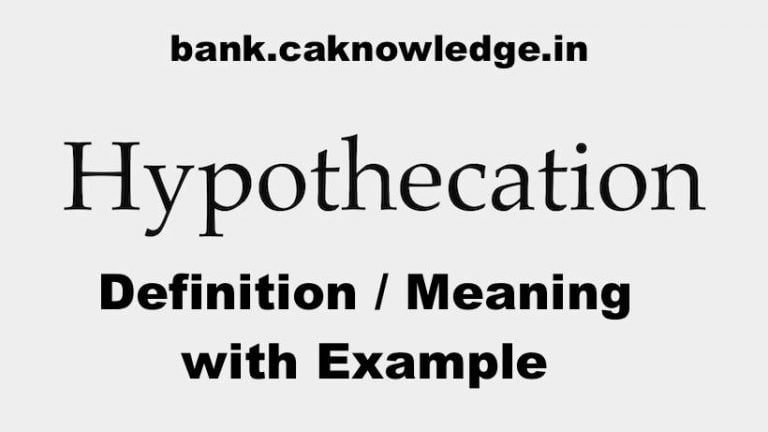Hypothecation Definition or Hypothecation Meaning with Example 2023. Hypothecation is the process by which a borrower pledges an asset as a collateral in order to obtain a loan, without forgoing the ownership rights to that asset.
In this article you can find complete details regarding Hypothecation like – What is Hypothecation, Legal definition of Hypothecation, Example of Hypothecation, Important points of Hypothecation, Rights available to borrower, Responsibilities of borrower etc. Recently we also provide What is pledge? . Now you can scroll down below and check complete details regarding “Hypothecation – Definition / Meaning with Example“
Hypothecation
Hypothecation is a a type of creating charge against the security of movable assets which is some what similar to pledge.. When a person borrows certain sum of money from a lender if he wants to provide that property as collateral security but the actual possession is with the borrower only. Then it is called as Hypothecation.
Must Read – What is pledge?
Legal definition :
Securitization and Reconstruction of Financial Assets & Enforcement of Security Interest Act 2002 defines Hypothecation as:
“Hypothecation means a charge in or upon any movable property, existing in future, created by a borrower in favour of a secured creditor, without delivery of possession of the movable property to such creditor, as a security for financial assistance and includes floating charge and crystallization of such charge into fixed charge on movable property”.
The lender receives a lien right that can be used to gain access to the asset in the event that the borrower defaults on the loan for any reason.
If the borrower makes any default in repayment of loan then the lender will have to first take the possession , then after proceed further.
Example :
If you purchase an auto or a car using finance facility provided by some banking companies are NBFC s then at the time of your inability to repay the loan timely , the lender can get the physical possession of vehicle so that he further proceed to clear his dues by selling the property Hypothecated.
Important points to be known :
- If a company is Hypothecating something towards a loan taken then it should be registered under Section 125 of the Indian Companies Act, before the Registrar of Companies.
- Without lender’s consent, no person can utilize the hypothecated assets for his/her own benefit And he can not sell the property without prior permission of lender.
Rights available to borrower :
- Trade with the goods by obtaining prior consent of lender.
- Possession of the goods
Responsibilities of borrower :
- He should Protect the goods from all possible risks.
- If he hypothecates the stock in his business then he should Furnish the details of the stocks held by him and the value thereunder from time to time;
- He should keep the stock at promised levels
Recommended Articles
